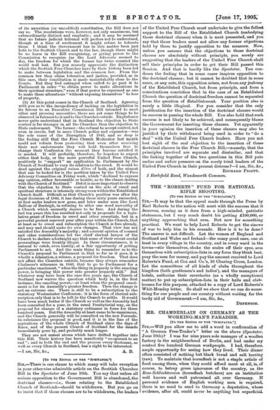[To ma EDITOR OP T11/1 arserAroam Stu,—There is one clause
to which many will take exception in your otherwise admirable article on the Scottish Churches Bill in the Spectator of June 10th. You say that unless all serious opposition to the Government Bill is abandoned, the doctrinal clauses—i.e., those relating to the Established Church of Scotland—should be withdrawn. But you go on to insist that if those clauses are to be withdrawn, the leaders of the United Free Church must undertake to give the fullest support to the Bill of the Established Church (embodying those doctrinal clauses) when it is next presented, and you say that those leaders must not allow any former objections held by them to justify opposition to the measure. Now, unless you assume that the objections to those doctrinal clauses are absolutely without principle, you surely are suggesting that the leaders of the United Free Church shall sell their principles in order to get their Bill passed this Session. And that is hardly like the Spectator. You con- demn the feeling that in some cases inspires opposition to the doctrinal clauses ; but it cannot be doubted that in some cases, at any rate, this opposition arises, not from.any jealousy of the Established Church, but from principle, and from a conscientious conviction that in the case of an Established Church the question of doctrinal freedom cannot be separated from the question of Establishment. Your position also is surely a little illogical. For you consider that the only justification for the insertion of the doctrinal clauses would be success in passing the whole Bill. You also hold that such success is not likely to be achieved, and consequently blame the Government for inserting these clauses. Yet apparently in your opinion the insertion of these clauses may also be justified by their withdrawal being used in order to "do a deal" with the United Free Church leaders. Have you not lost sight of the real objection to the insertion of .these doctrinal clauses in the Free Church Bill,—namely, that the principles involved are separate and dissimilar, and that the linking together of the two questions in this Bill puts undue and unfair pressure on the sorely tried leaders of the United Free Church in their present distress P—I am, Sir, &c.,
RICHARD PIGOTT.
1 Earlsfield Road, Wandsworth Common.






































 Previous page
Previous page